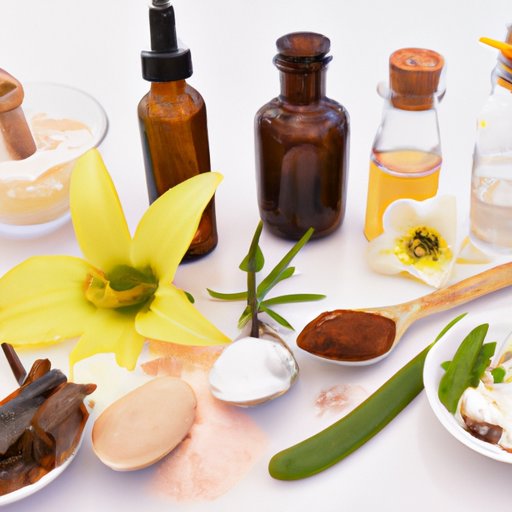I. Introduction
Healthy skin is an important part of our overall well-being. In fact, skin is the largest organ in the human body. Over the last few years, people have become increasingly interested in natural alternatives to harsh chemical-based skin care products. These alternatives are kinder to the skin and are thought to be healthier for our overall well-being. In this article, we will discuss how to make natural skin care products at home and what benefits they offer compared to store-bought products.
II. How to Make Natural Face Masks and Scrubs at Home
Many skin care products contain irritating chemicals that can damage the skin, particularly if you have sensitive or acne-prone skin. Making your own products is a good idea as not only can they be tailored to your specific skin type but you also have the added benefit of knowing the exact ingredients used.
Here is an easy step-by-step guide to making natural face masks and scrubs using simple ingredients:
Face Mask with Honey and Avocado
- 1 tablespoon of honey
- 1/2 ripe avocado
- 1 teaspoon of lemon juice
Mix all the ingredients together until you have a smooth paste. Apply to your face and neck, avoiding the eye area. Leave it on for 15-20 minutes and rinse off with lukewarm water.
Oatmeal Face Scrub
- 1/2 cup of oats
- 1/4 cup of milk
- 1 teaspoon of honey
Combine all the ingredients and mix well. Apply to your face and gently massage, avoiding the eye area. Leave it on for 10-15 minutes and rinse off with lukewarm water.
Don’t forget to tailor these recipes to your individual skin type – for example, if you have oily skin, you may want to add a teaspoon of apple cider vinegar to the honey and avocado mask for extra astringency.
III. The Benefits of Using Natural Ingredients in Skin Care
Using natural, plant-based products for your skin can result in healthier, hydrated, and less inflamed skin. Many common household ingredients have unique properties that can add benefits to your skin care routine. Here are some examples:
- Coconut oil: is used in many natural moisturizers because it is rich in fatty acids that are easily absorbed by the skin.
- Green tea: contains antioxidants that can reduce inflammation and help protect the skin from damage caused by free radicals.
- Lavender essential oil: can soothe and relax the skin, making it great for use in face masks and toners.
You can incorporate more natural products into your daily skin care routine by making simple switches such as using coconut oil in place of your regular face cream or replacing chemical-based toners with natural alternatives like rosewater or witch hazel.
IV. The Potential Harm of Synthetic Chemicals in Skin Care
Many commercial skin care products are filled with synthetic chemicals that may have negative side effects on your skin and overall health. For example, parabens are commonly used in cosmetics as a preservative but they have been linked to various health concerns including breast cancer. Other chemicals like Propylene Glycol and Sodium Lauryl Sulfate, which give products their smooth texture and foam, can lead to skin irritation and allergies.
If you’re looking to avoid synthetic chemicals in your skin care routine, the best thing you can do is read product labels and opt for natural products or make your own.
V. Homemade vs. Store-bought Skin Care Products
Making your own skin care products has many benefits over buying store-bought products:
- Cheaper: Natural ingredients are often less expensive than products with synthetic chemicals.
- Personalized: You get to tailor the products to your individual skin type.
- Healthier: Natural products are kinder to the skin and you avoid the potential harm from synthetic chemicals.
However, there may be occasions when you will find store-bought products more suitable. For example, if you have a more severe skin condition, you may want to consult with a dermatologist to find the best course of action.
VI. How to Create a Daily Natural Skin Care Routine
Establishing a daily skin care routine is an essential part of achieving healthy and glowing skin. Here’s a step-by-step guide to creating a natural skin care routine:
- Start with a gentle cleanser to remove dirt and makeup.
- Use a toner to balance the pH of your skin and add hydration.
- Apply a facial serum to address any specific skin concerns you may have such as wrinkles, blemishes, or hyper-pigmentation.
- Moisturize your skin with a lightweight product that targets your skin type.
- Apply sunscreen (with at least SPF 30) to protect your skin from sun damage and premature aging.
Adjust the routine to your individual needs. For example, if you have dry skin, you may want to use a heavier moisturizer or swap out your cleanser for a gentle oil-based cleanser.
VII. Conclusion
Now you know the many benefits of natural skin care and how easy it is to incorporate it into your daily routine. Making your own skin care products using natural ingredients is a great way to take control of what you’re putting on your skin. Opt for natural products when possible and take the time to establish a consistent routine for better results.
(Note: Is this article not meeting your expectations? Do you have knowledge or insights to share? Unlock new opportunities and expand your reach by joining our authors team. Click Registration to join us and share your expertise with our readers.)
